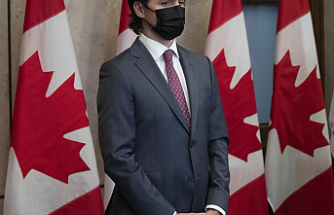Monday's arguments will be heard by the justices in two cases involving whether abortion providers or Justice Department can challenge the law in federal court. The Justice Department has an unusual enforcement system that its defenders claim protects the law from review by federal courts.
Justice Brett Kavanaugh allowed the law's implementation in September, in a split court decision. He suggested that the unusual enforcement system could pose a problem.
He said that there was a loophole that has been exploited or used here. Kavanaugh suggested that the 1908 Supreme Court case's "principle" would suggest that Kavanaugh extend the principle "here, arguably" and close the loophole.
Five conservative justices, three of them appointed by President Donald Trump were part of the majority that allowed the law to take effect. Chief Justice John Roberts was joined by the three liberal justices on the court in dissent.
The Supreme Court wasn't hearing either case Monday. In both cases, the right to abortion was directly at issue. The Justice Department and abortion providers are suing Texas because the Texas law is inconsistent with Supreme Court landmark rulings that prohibit a state from banning abortions early in pregnancy.
In support of the United States, Solicitor general Elizabeth Prelogar stated that Texas' law was passed in "open defiance” of Supreme Court precedents. She stated, "It enacted law that clearly violates the precedents of this court."
The 1973 Roe v. Wade decision by the Supreme Court and the 1992 Planned Parenthood v. Casey decisions of the 1992 Supreme Court prohibit states from banning abortion prior to viability. This refers to the point at which a fetus is capable of living outside the womb. It occurs around 24 weeks into a pregnancy.
In a case involving Mississippi's ban of abortion after 15 weeks, the justices will hear another challenge to these decisions. These arguments will be heard Dec. 1.
Since September, the Texas law has been in force. The Supreme Court declined to interfere except for a 48-hour time in October when it was blocked in a lower court. The court moved at an extraordinary pace and got involved again in less than two weeks. The court did not offer any explanations for the speed with which it heard the cases.
Governor Greg Abbott signed the Texas ban into law. Greg Abbott signed the Texas ban into law in May. It prohibits abortion after cardiac activity has been detected in a foetus. This is usually around six weeks, and before many women realize they are pregnant.
There are exceptions to the law for medical emergencies, but not for incest or rape.
Twelve other states have also enacted early pregnancy bans, but they have all been stopped from taking effect.
Instead of having state officials enforce the law Texas allows private citizens to sue anyone who aids or abets abortion. If a suit is successful, the plaintiff can get at least $10,000. The law doesn't allow women who have had an abortion to be sued.
Roberts asked during Monday's arguments whether it was possible to challenge the law if Texas increased the entitlement to $1 million. Texas' lawyer told him no.
If they break the law, abortion providers face severe financial penalties. After finding cardiac activity, abortion clinics across the state have stopped performing them.
Both the Biden administration and the providers agreed that the result is that women who have the financial means to travel to other states are more likely to continue their pregnancies, while those without the means to do so must choose between continuing them or finding other, potentially deadly ways to end them.
Jonathan Mitchell, the architect of the law, and the state claim in their briefs they don't have the right to sue the Justice Department and state judges. They claim that there is no way to block the law because federal courts cannot force state judges not to hear the lawsuits authorized by the law.









